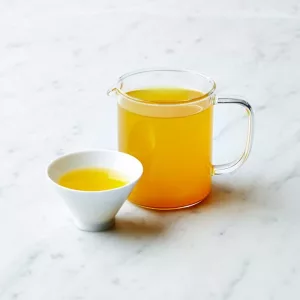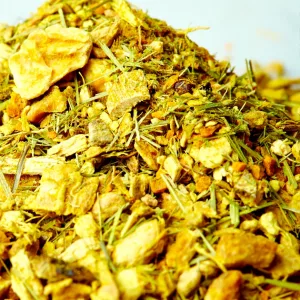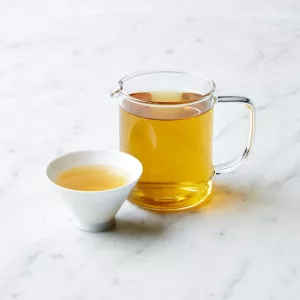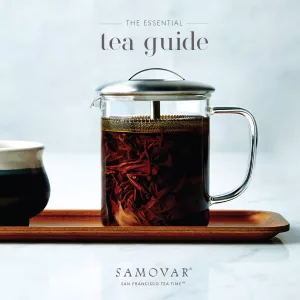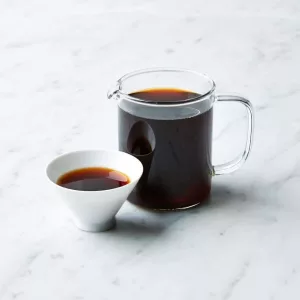
What in the world does a warm cup of water and some herbs have to do with uncovering Life’s meaning? Or fostering peace amongst the people of planet earth?
Discover how the power of Tea Ceremony turns simple, ritualized acts into transformative, life altering experiences.
Sixty kilometers east of Hanoi, our metal, flat-bottomed skiff plied the muddied shallows of the Yen River, past the foot of the Mountain of the Perfume Traces. A short way up from the river sat the Perfume Pagoda, one of northern Vietnam’s most popular sites of worship during the Tet Holiday season.
Tet is Vietnam’s lunar new years, a popular time for families to get together for meals, fellowship and prayer. The Perfume Pagoda, Chua Huong Tich, dedicated to Quan Am, the guardian Spirit of Mother and Child, is one of several shrines built into the limestone caves of this lush, mountainous region.

Our short glide up the river left my friend and guide, Tuan, relaxed and happy. I thanked our pretty oarswoman, Tuan translating, and we disembarked. Before getting on with the next leg of our pilgrimage to the pagoda cave, Tuan suggested a ‘comfort stop’, his term for a short rest, beverage and snack.
A cool breeze rippled the river and sent the moored sampans bobbing. We walked a few minutes before arriving at a rough and ready little market where Tuan found us a wobbly table in a tarp-covered, makeshift restaurant, filled with the infamous, Asian low plastic stools.
On this late morning, I was the standout white guy, the token American who within minutes had drawn a small crowd of village children, gawking, laughing and pointing, amused at me as if I’d come in dressed as a clown. While my Vietnamese vocabulary extends to a few dozen phrases, I take pride in my ability to at least imitate the language’s six tones.
If I was to be the morning’s entertainment, I figured why not play it to the hilt? I hit the youngsters with a few of my best lines: “I swam up river. No boat! No boat for me!”
Tuan and I did a Laurel and Hardy shtick, where he’d whisper my fun observations back to me in Vietnamese that I would then parrot back to the crowd.
“Where are you from?” one boy asked in English.
“I am from Wei!” I bluffed, giving him the name of a seaside city on the central coast.
Tuan, familiar with my routines, set about ordering a few dishes of sautéed vegetables and tofu, rice, pho, a thinly sliced meat and rice noodle dish, and Vietnamese coffee. I’d come to love this sweet concoction of condensed milk, sugar and chicory flavored coffee beans.
Out of nowhere, a middle-aged man with a husky build and a scowl imposed himself on our languid meal. Plastic stool in hand, he plunked down opposite our spot, leaned in and began upbraiding me in rapid-fire Vietnamese, his spittle adding an un-welcomed new flavor to my pho. Too overwhelmed by the intrusion to respond, I darted Tuan a look that said, “Am I in trouble here?”
Tuan too was speechless. I couldn’t understand a word of the Vietnamese, but when he began pantomiming gunfire, it was hard to misread his play by play of what I guessed to be U.S. violence against his countrymen during the American War. He didn’t look as if he was going to heave my bowl of pho in my face as much as let my American ass fill a need to unburden some seriously pent up anger.
“He’s talking about the war with America. He’s talking about the past,” I say to Tuan.
Tuan nodded.
Our aggressive, uninvited guest’s diatribe begins to lose momentum, an opening I took to respond.
“Tell him,” I said to Tuan, “the past is called the past… because it’s in the past.”
The angry man’s face drew a blank and he stopped screaming at me. He rose, withdrawing from our table as abruptly as he’d appeared. The children recoiled a bit but lingered, all traces of smiles and mischief gone from their faces.
What was left of my meal was nudged to the side, as I turned to Tuan to get the check in hopes of retreat. I feared I hadn’t seen the last of our visitor. When the waiter came, I handed my wallet to Tuan who fished out enough money to cover our tab. I felt a bit too jarred to even bid the children adieu. I just wanted to get out of there, when the man reappeared suddenly, marching toward us.

To my relief, I saw that it wasn’t a firearm or machete he held in his hand, but what looked to be a turquoise teapot and three small cups.
It was the same man and it wasn’t. His entire demeanor had changed. I still couldn’t understand his words, but his voice was filled with warmth. He pressed on my shoulder to sit me back down. A man who had spit on me 10 minutes earlier was now pouring me a cup of tea. Following a formalized action that said, “I’m over it”, he filled my cup and called to the waiter, who brought over a plate of cassava sweets.
We each introduced ourselves. Photos came out of wallets. Surprisingly few words were exchanged, mostly nods and a feeling of goodwill. Each time I finished my cup, which only required two good sips, my new comrade quickly refilled it. Our plan to reach the Perfume Pagoda felt deferred. Whatever healing might come from visiting a Buddhist shrine was taking place right here, now.
~Paul T. for Samovarlife.com
Samovar’s Ceremonial blog contributor, Paul T. reaches for Monkey Picked Iron Goddess of Mercy, Kuan Yin’s classic elixir, to ease the monkey mind and loves getting the job done with assistance from the smoky buzz of Samovar’s Russian Blend.

